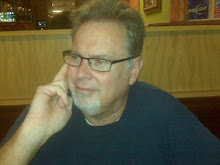
Now that I look back everything was neat and perfectly symmetrical in my parent's house. And nowhere was it more evident than in the top drawer of my father's dresser. The first thing you noticed was the mahogany inlaid jewel box that sat in the center of the drawer. I could never walk past the dresser without looking at the contents of the box. The many gold and silver cuff links. I've never had any use for them but the last time I was at home I asked my father for a pair. They were more talisman than fashion. My father had at least fifty pairs of collar stays. I've never bought one. Today most collar stays are sewn in.
Medals. All colors, shapes, and sizes. All brought back from World War ll. Red and blue sharpshooter medals. Lieutenant bars. Regiment colors. No purple hearts. ( My father was blown off a seawall at the Battle of Okinawa. My war experience was pretty clear cut. Anti-war demonstrations in Berkeley and San Francisco during the '60s.)
There were also photos of my father, young and cocksure; standing on a beach by his home in Atlantic City, shirtless but in uniform standing in the desert holding up a rattlesnake, group shots of his pals overseas during the war. No matter where, what, or when, the pre-war and war pictures made him look stylish and heroic. But I've come to understand that my father's most glorious experiences were during the war. Later he had a hard time understanding why life never measured up to that again. I believe those photos in his drawer were reminders of his youth, when all the world was before him.
To the right of the mahogany box lay his perfectly positioned , perfectly rolled socks. Black or blue dress. That was it. Next to the socks lay the leather and gold perfectly aligned garters. Putting them on was an important part of my father's daily regime. He had three or four to handle a six-day usage. Stacked neatly to the right, ironed and folded into perfect squares were dad's supply of cotton handkerchiefs. I'm not sure I ever saw one soiled. To the left of the box lay his Jockey briefs. My father said once he left the army he would never stand in lines or wear boxer underwear. Civilian freedom meant Jockey briefs, I suppose. The last, and the most provocative item, was his razor-sharp, leather-handled, sheathed hunting knife. Hidden expertly under the stacks of the underwear, it, along with a 22 rifle in the closet, made up Dad's domestic arsenal. He would use them to defend our home in case of an "invasion."
I will never forget my father's ritual of dressing in the morning. A good many of his movements I have somehow picked up. I believe I watched them so often when I was little that they became part of me. Dad never improvised. I believe he thought improvisation was against God's nature and only people that were weak in character surrendered to it. Every morning was the same choreographed dance that never changed or faltered.
First he put on the briefs and the undershirt. He snapped the waistband to make sure it had significant tension and fit snugly. Then, he put on his clean, white undershirt that smelled fresh from hanging on the clothesline the previous afternoon. He then put on his crisp, ironed, white shirt and his regimental stripe tie. Next he stretched his socks up and hooked them to his garters. My father put on his shoes next. He would retrieve them from his closet, buff them, and pull out the shoe trees. They were Florsheim brogues, wingtips of the highest order. My father always told me, " never try and save money on shoes. Buy the best, polish them, and they will last forever." The shoe strings were stiff and waxed so they would hold tightly.
He might walk around the house for a half hour or so only in his underwear, shirt, socks and shoes before he continued. And then, at the last minute, before he left for work, he would slip on his slacks and coat.
At the end of the daily exercise one word emerged: order. All the shoes were polished and treed. All the slacks pressed and hangered. All the shirts hung up and spread symmetrically across the closet bar so no one shirt touched the other, left to right, starting with dress and ending in sport. Order.
Everything filed . In a way, the predictability was comforting. But it also symbolized the parting of our natures. Dad's dedication to order and responsibility and my rebellion against all his order and responsibility.
My unpredictability was at the core of our problems. I don't even think dad was as concerned with the results as with the method. I am the way I am because of some very intense, complex interactions with my father at a very early age. Today I know that my course was being charted before me and I didn't even know how or why.
###

No comments:
Post a Comment